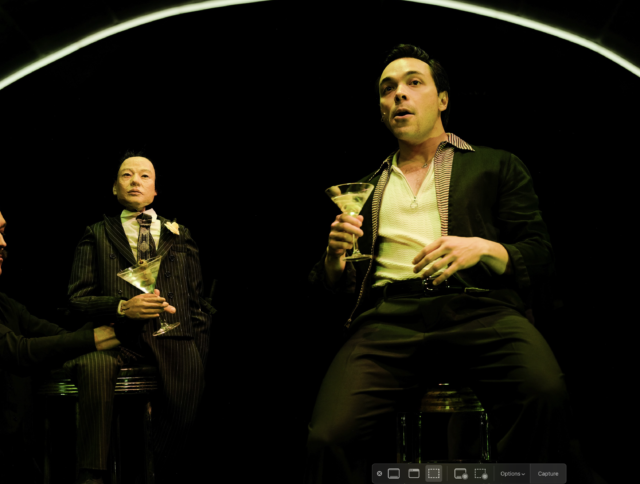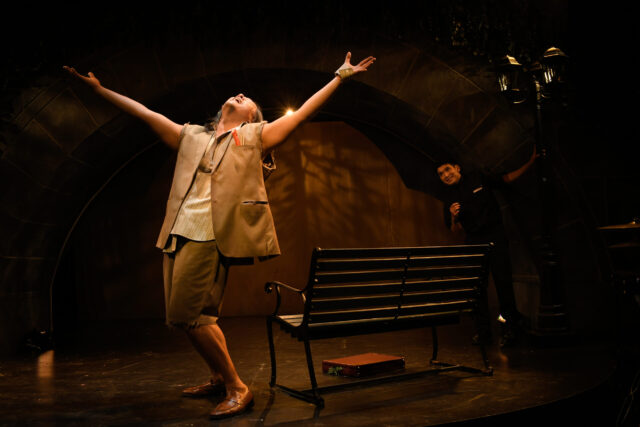
Jimmy Mako (Sam Simahk) has trouble in mind in See What I Wanna See (photo © Thomas Brunot)
SEE WHAT I WANNA SEE
154 Christopher Street
Through September 29, $64-$93
www.ootbtheatrics.com
“We only see what we want to see; we only hear what we want to hear. Our belief system is just like a mirror that only shows us what we believe,” spiritual teacher and author Don Miguel Ruiz said.
When an early version of Michael John LaChiusa’s See What I Wanna See, then called R Shomon and based on three short stories by Japanese writer Ryünosuke Akutagawa, debuted at the Williamstown Theater Festival in 2004, audiences saw a stellar cast consisting of Audra McDonald, Henry Stram, Michael C. Hall, Tom Wopat, and Mary Testa. When the musical moved to the Public the next year, it featured Idina Menzel, Marc Kudisch, Stram, Aaron Lohr, and Testa, garnering Drama Desk nominations for outstanding music and lyrics. Audiences must have been seeing what they wanted to see, hearing what they wanted to hear.
Out of the Box Theatrics’ current revival at 154 Christopher, particularly the second act, is hard to watch. Each act begins with a snippet from Akutagawa’s “Kesa and Morito,” about a pair of doomed lovers portrayed by Marina Kondo and Sam Simahk as well as small Japanese puppets. “Tonight I kiss my lover / for the last time,” Kesa announces at the start.
In the first act, R shomon — based on Akutagawa’s “In a Grove,” which was adapted by Akira Kurosawa into the classic film Rashomon — takes place in New York City, as thief Jimmy Mako (Simahk) sets his sights on bedding a nightclub singer (Kondo) and robbing her wealthy husband (Kelvin Moon Loh) in Central Park. What eventually happens is told from multiple perspectives, by a janitor (Zachary Noah Piser), the thief, the wife, and the husband, channeled through a medium (Ann Sanders). It’s a lurid tale, also told with puppets, that quickly becomes confusing and annoying, the characters’ actions and motivations difficult to believe. Kurosawa crafted the story into a brilliant exploration of a rape and murder as seen through the eyes of four witnesses from four different angles; LaChiusa focuses more on the actions themselves, creating a distance between audience and performer.

People wait for a miracle in Central Park in Michael John LaChiusa revival (photo © Thomas Brunot)
The second half, “Gloryday,” is a retelling of Akutagawa’s “Dragon: the Old Potter’s Tale,” in which a priest sets up a practical joke that becomes something much more than he ever could have expected. In LaChiusa’s version, a priest (Piser) has lost his faith following the 9/11 terrorist attacks. “My life, now, is . . . is like . . . a sentence in which every word seems to be missing a letter,” he says to an offstage monsignor. He argues with his aunt (Sanders), an avowed socialist and atheist who declares there cannot be a G-d because of all the war, crime, graft, and “stupid new TV shows.”
The priest decides to pull a prank on New York, delivering a message that announces, “In three weeks / on Tuesday / at one P.M. sharp / a miracle will occur / here in Central Park / Before our very eyes / from the depths of the pond / Christ will rise! / Believe! / And be free! / Believe and be free!” In the park he meets a CPA (Loh), an actress (Kondo), a reporter (Simahk), and others who are all looking for more out of life and hoping that this promised miracle might be their way forward. But it turns out the joke is on the priest.
LaChiusa, whose previous shows include The Wild Party, Queen of the Mist, and The Gardens of Anuncia, and director Emilio Ramos never get a firm grasp of the narrative, resulting in clunky staging. The hand-operated marionettes in the first act are cute and add Japanese flavor, but the shadow puppets in the second feel unnecessary. Also unnecessary is the actors being miked in such a small, intimate theater, furthering the distance between audience and performer. (The sound is by Germán Martínez, with moody lighting by Kat C. Zhou, effective costumes by Siena Zoë Allen, unmemorable choreography by Paul McGill, and puppet design by Tom Lee.) Emmie Finckel’s set is anchored by a Central Park arch lined with LED tape.
Maybe in 2004, during the Iraq War, the second act was timely, but in 2024, twenty-three years after 9/11, it feels dated and manipulative; New Yorkers will never forget what happened, but we have also moved on. These days we are searching for other kinds of miracles as we fall prey to new forms of practical jokes primarily over social media, where we see what we want to see and hear what we want to hear.
[Mark Rifkin is a Brooklyn-born, Manhattan-based writer and editor; you can follow him on Substack here.]